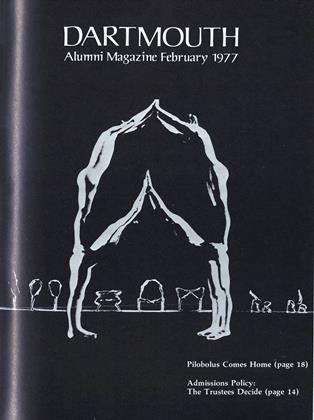Poets' first books all but invite a cliche response. "Brilliant," "tough," "immediate," "ironic," even the übiquitous "moving": Liman's blurb writers fell for most of the stock adjectives. The temptation is to add yet another old chestnut: "uneven but promising."
But none of this will do. To be sure, Liman's first poems are promising — and a bit uneven to boot — but their future promise is predicated on an already solid present achievement. His subjects are admirably precise, unabstract, his images firmly rooted in the particular, but by skillful manipulation of the skein of metaphor he also often succeeds in weaving a perceptible over-plaid of the universal into the fabric of his particularity.
Liman uses few personae in his poems, preferring to speak as the unmediated "I," for himself and of himself. Taken as a whole, the poems therefore not only exhibit some lack of variety but also give the impression of a somewhat too intense preoccupation with self. Perhaps a bit more aesthetic distance is too much to ask for, however, for this book deals with a profoundly felt, almost private theme: exile.
An American, Liman moved north a few years ago to teach English in a Canadian university. The early poems in the, book record his initial frustrations, his bewilderment, even bitterness, at his alien surroundings. Gradually the bitterness is muted, replaced by a sentimentalized nostalgia, an over-idealized image of times past in another country. At the end the poet comes to terms with his self-chosen exile. His spiritual journey is concluded, his tensions resolved. He has "landed." Swinging with his small daughter in a backyard in Ontario, saying this love in our backyard swingand hearing your laughtersay yes to the sunwas the very best swingingthat's ever been swung.
LANDINGBy Claude Liman '65Sesame, 1976. 75 pp. $3.00
 View Full Issue
View Full Issue
More From This Issue
-
 Feature
FeatureA simple mental technique... A simple mental tech... A simple mental... A simple...
February 1977 By PIERRE KIRCH -
 Feature
FeatureNever Let Go
February 1977 -
 Feature
FeatureTwelve legs, six imaginations, one soul Pilobolus
February 1977 By PHILIP HOLLAND -
 Feature
FeatureComposite Artist
February 1977 By M.B.R. -
 Article
ArticleStepping Out with a Bounder
February 1977 By D.M.N. -
 Article
ArticleGray Is Beautiful
February 1977 By ELIZABETH CRONIN '77
R.H.R.
-
 Article
ArticleFurther Mention
May 1976 By R.H.R. -
 Books
BooksAn Attendant Lord
November 1976 By R.H.R. -
 Books
BooksMonticello to Montmartre
November 1976 By R.H.R. -
 Books
BooksCity Views
April 1977 By R.H.R. -
 Books
BooksNotes on a Yale man's journal and the 'elbowing self-conceit of youth.'
MARCH 1978 By R.H.R. -
 Books
BooksOut of the Night
November 1978 By R.H.R.
Books
-
 Books
BooksAlumni Books
NovembeR | decembeR -
 Books
BooksStatistical Methods Applied to Education
February 1918 By J. L. M. -
 Books
BooksTHE BLACKSMITH OF VILNO
January, 1931 By L. L. Silverman -
 Books
BooksTheir Message
May 1980 By Laurence L. Edwards -
 Books
BooksSKELETON OF LIGHT.
December 1961 By RICHARD EBERHART '26 -
 Books
BooksMENTION MY NAME IN HAWAII!!!!
November 1973 By ROBERT O. WHITE'54

